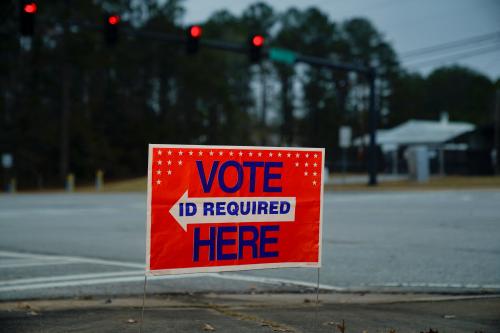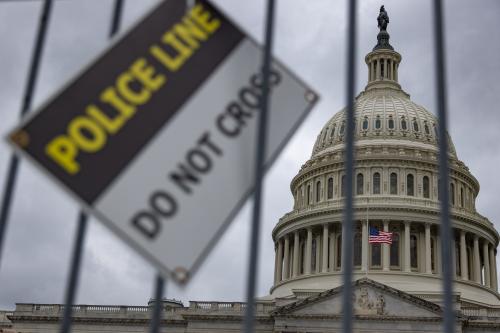On the first day of 2012, Nigerian President Goodluck Jonathan imposed a state of emergency in four of his country’s 36 states and closed parts of its borders with Cameroon, Chad and Niger. He also pledged to crush Boko Haram, the self-declared al-Qaida affiliate. The emergence of northern Nigeria as a theatre in global jihadism has been one of the grim developments of the past two years. On December 25, 2009, the failure of explosive materials to detonate in the underwear of 23-year old Nigerian Umar Farouk Abdulmutallab prevented a horrific airplane calamity. It was soon learned that Abdulmutallab had been prepared for this assignment by Anwar al-Awlaki, the terrorist mastermind subsequently killed on September 30, 2011 by American drone aircraft in Yemen.
Several bombing incidents in Nigeria on Christmas Day 2011 showed the potent and merciless character of the insurgency. In one of these incidents, 37 parishioners were killed in a Catholic church on the outskirts of the capital, Abuja. Boko Haram militants, who have also engaged in several armed confrontations with Nigerian security forces, claimed responsibility. Similarly, 25 people died when the same militants bombed U.N. headquarters in Abuja on August 26, 2011. While Nigeria confronts these dire threats, the world community cannot overlook the need for comprehensive global engagement to advance governance, security and development in Nigeria. Although the challenges are great, so also are the resources available to meet them.
At least half of Nigeria’s estimated 160 million citizens are Muslim, and the greater majority resides in the northern states of the federation. Extremist groups have periodically emerged among them, but usually dissolve after brutal confrontations with security forces. This is no longer the case. Boko Haram, which in Hausa, the lingua franca, means “western education is sacrilege,” is unyielding. It rejects what the northern region most urgently needs: rapidly improved education to narrow the widening gap with the southern states. It also leverages resentment many northerners hold for the relative success, once economic and now also political, of the more-Christianized south. Boko Haram’s recent attacks and announcements are heightening regional, ethnic and religious tensions. A recent declaration called on southerners to leave the north, a chilling reminder of the pogroms and mass migrations that preceded the Nigerian civil war of 1967-70.
Reversing the terrorist tide in Nigeria will require expert counter-insurgency assistance along with efforts to accelerate political and economic progress. Secretary of State Hillary Rodham Clinton, in a visit to Abuja in August 2009, spoke forcefully of the need to reduce political corruption. Much remains to be done to improve transparency and accountability in the use of public funds. This struggle can draw on many resources including myriad civil society organizations, diverse and vigorous independent media, the wide availability of cell-phones, and a judiciary that intermittently demonstrates the capacity to curb the abuse of power. The appointment of a new head of the federal anti-corruption agency in November 2011, the Economic and Financial Crimes Commission (EFCC), together with the recruitment of capable individuals to lead the economic and finance ministries and the Central Bank, could accelerate the pursuit of honest and effective government.
Goodluck Jonathan presides over a highly presidential system. In May 2010, he succeeded Umaru Yar’Adua who died after a prolonged illness. Jonathan, who had formerly served as governor of Bayelsa, an oil-rich state in the Delta region, was elected to a four-year term in April 2011. After more than a decade of military operations, and the lavish distribution of funds by government agencies and petroleum companies, armed insurgencies in the delta region have abated. The opposite is true in the north which, together with the rise in terrorism, has experienced economic contraction and the loss of the patronage-commanding presidency.
The Jonathan presidency is caught in a perfect storm. His legitimacy is challenged by some northern political barons who believe that presidential power should have been retained by their region in keeping with an extra-constitutional power rotation principle. This dissension was echoed in the fierce riots throughout the north after Jonathan’s electoral victory in April 2011. Jonathan has promised to serve only one elected term (although he is eligible for two), which holds the threat of condemnation by opponents if he reneges and profound dismay among supporters if he does not. Moreover, major infrastructural reforms must be rapidly executed in virtually every sector despite systemic inefficiencies. Jonathan is currently pushing through an unpopular reform long attempted by his predecessors, the removal of subsidies on petroleum, much of which is imported because of Nigeria’s dilapidated refineries. While vowing to reduce corruption, Jonathan must keep federal largesse flowing to party bosses to whom he owes his ascendancy and political survival.
What can the United States and other major countries do to help Nigeria address the immediate security crisis as well as safely navigate the remaining 40 months of Jonathan’s presidency? In the terminology of Joseph Nye, a smart power strategy is required to skillfully combine hard and soft power. The first priority should be to neutralize Boko Haram without a massive display of American counter-terrorism prowess, which could provoke the public backlash seen elsewhere, notably in Pakistan. The required actions include a rapid upgrade in the professional and technical capacity of Nigeria’s security forces. They must begin intercepting Boko Haram militants before they strike, but also avoid the general brutalities that have fomented deeper anger. Nigerian forces have been accused of previous abuses including extra-judicial killings, making the removal of legal constraints under the state of emergency a cause for extreme vigilance. Second is the need to engage Nigeria’s vast diaspora, perhaps a million-strong in the United States. With their education, training and material resources, and their commitment to improved governance in their native country, they have much to contribute to capacity building, accelerated development and the rule of law. Third, a determined effort must be made to promote high quality and job-producing growth through trade and investment in a country that has the potential to match the rising nations of Brazil and Indonesia.
While pleading guilty in the Detroit federal court on October 12, 2011, Abdulmutallab warned: “You laugh at us now, we will laugh at you later.” As Nigerian security and social forces mobilize to meet a challenge that is implacable and remorseless, this pivotal nation must be helped intelligently, assiduously, and comprehensively to succeed.



Commentary
Reversing the Terrorist Tide in Nigeria: The Need for Smart Power
January 3, 2012